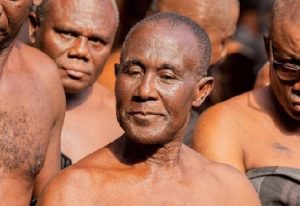Minister of Lands and Natural Resources, Samuel Abu Jinapor has defended the Asantehene, Otumfuo Osei Tutu II over recent comments about the new Land Act.
Earlier this month, the Asantehene was reported to have publicly kicked against portions of the Lands Act, 2020 (Act 1036) which gives the subjects of chiefs the power to haul the traditional rulers before a court to demand accountability on proceeds from land sales.
He stated his position during a meeting between the Ashanti Regional House of Chiefs and the sector Ministry, justifying his opposition to the said portions specifically with land administration dynamics in the Ashanti Kingdom.
Addressing the reports that suggested the Otumfuo was evading accountability, the Minister said in an interview with Joy News, “I explained that first of all when you read the Act as a whole, the Act defines who can mount an action first of all.
“Number two the Act also enjoins anybody who wants to go to court to exhaust the internal customary procedures before you can go to court and when it got to Otumfuo’s turn, Otumfuo said look my Chiefs don’t be too worried about this provision because it doesn’t particularly apply in Asanteman because here we account properly for the proceeds of our land administration so the issue of invoking that provision will not even arise in the first place,” he said.
“Otumfuo did not say the sections of that Act does not apply to Asanteman. He didn’t say so,” he stressed before disclosing that the land administration and accountability system in the Ashanti region was one of the best nationwide.
“I agree with him totally because the places where I have the least trouble in terms of lands administration is Asanteman, Ashanti Region because the lands are properly managed and the proceeds that come out of the sale of land are accountable,” he added.
What the Otumfuo said
“The elders of various chiefs are the people who can call for accountability and that is when I step in. There is accountability in the kingdom but not to any individual,” he said.
“Not all that is printed here (the Act) is applicable to my jurisdiction. I put chiefs and fetish in charge of the lands in the kingdom. The chiefs are not accountable to any youth.”
“In the new Act, the chiefs are caretakers on the lands. They hold it in trust. So their subjects can demand accountability even in court. In many areas, chiefs misappropriate income from the sale of land,” the Damongo MP explained.
Role of traditional authorities in the Act
The Act holds chiefs, clan heads, family heads or any authority in charge of the management of stool or skin, clan or family lands accountable as fiduciaries.
As trustees, the “managers” must be transparent, open, fair, and impartial in making decisions that affect the lands they manage.
They are also subject to disciplinary sanctions if they fail to comply with their trustee duties.
Meanwhile, the Asantehene is advocating for a review of laws regulating mineral resources in the country for purposes of equity in sharing of benefits.
Source: Ashantibiz
Submit your stories or articles to us via WhatsApp +233-245092915




